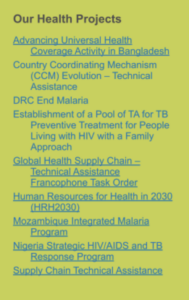In Focus: 3 Questions with Julie Becker on Chemonics International’s Global Health Division
By Julie Becker, Senior Vice President of the Global Health Division, Chemonics

The Chemonics-led HRH2030 program worked in Mali to tackle high levels of maternal and child mortality. In this photo, an HRH2030-trained community health worker uses a job-aid poster to explain a maternity center’s services at a village meeting on maternal and child health in Kolosso, Mali. Photo Credit: Ibrahima Kamaté, HRH2030 Mali
Question 1: When and why did you join Chemonics?
I joined Chemonics to lead the Global Health Division at the beginning of 2020. Prior to joining, I worked in the private sector, although I was involved with USAID-funded projects much earlier in my career, so I’ve come full circle. As a former global health strategy consultant, I was excited for the opportunity as well as the freedom and space Chemonics provided me to set a new strategy, innovate, and work with my team to grow the division. I was also impressed by the people I met. Chemonics felt like a much more human-centered workplace than I had imagined for a large company. Over the past year-and-a-half, I’ve been inspired by how this employee-owned company supports its staff with educational and learning opportunities.
Question 2: What do you see as key strengths that Chemonics brings to global health?
In our Global Health Division, a sister division to our Supply Chain Management division, we pride ourselves on taking a systems thinking approach. Our work addresses some of the world’s most challenging health issues, such as HIV/AIDS, malaria, and reproductive health. We’re known for our expertise in human resources for health (HRH) and health supply chain management, two critical building blocks for health systems strengthening (HSS). We’re also growing our work in quality service delivery, and leadership and governance, also key HSS components. We work closely with governments, local actors, and the private sector to develop integrated solutions to improve health outcomes around the world.
I’ve found Chemonics’ systems for stewarding donor resources and managing global flagship and country-specific projects to be impressive. One global flagship we lead is Human Resources for Health in 2030 (HRH2030), through which we’ve worked in more than 30 countries to improve HRH performance and productivity. In Mali, the program increased availability and access to quality reproductive health and MCH services, impacting more than 2 million women and 1.5 million infants. In Malawi, our team strengthened national and district-level HRH planning and management, and developed new tools like HOT4ART to optimize the health workforce for HIV care, a critical strategy for maintaining continuity of services amidst COVID-19 constraints. We’ve also begun addressing health worker resiliency by partnering with Brazilian-based start-up Vitalk to test and implement an AI-powered mental health chatbot. In Indonesia, our efforts to enhance HRH information systems and instill a culture of data use were pivotal in assuring evidence-based decisions around the COVID-19 response. These are just a few examples of our successful activities under HRH2030, which is coming to a close this year. Overall, the program demonstrates our strengths working on multiple levels – client, community, health worker, and subnational and national government – to create effective systemic change and a stronger and more resilient workforce.
Question 3: What is your vision for Chemonics’ Global Health Division?
As we all know, global health strategies are evolving rapidly due to the global pandemic. As a company, we’re used to adapting quickly to the world around us. The pandemic has elevated the need for a holistic, systems thinking approach to sustain resilient health systems. So, we’re expanding our technical team with additional experts in health systems strengthening, service delivery, malaria, and HIV. We’re also strengthening our use of data across the board. Most importantly, we’re cultivating partnerships with global, regional, and local organizations. We’re striving to be really good partners with other organizations by fostering strong technical collaboration and joint decision-making. I’m excited to nurture our relationships virtually and hopefully in-person, to meet and re-meet clients and colleagues from peer organizations, interact in the professional community, and spend time with our country staff members and their programs.
